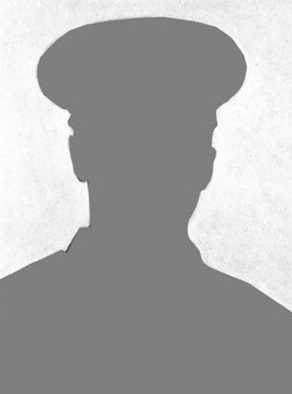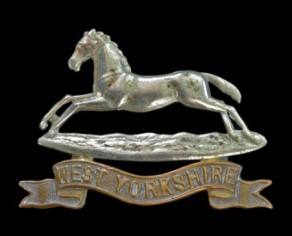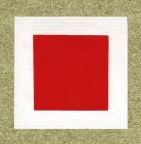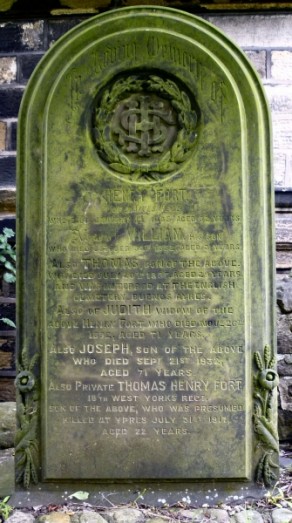Main CPGW Record
Surname: FORT
Forename(s): Thomas Henry
Place of Birth: Silsden, Yorkshire
Service No: 18/679
Rank: Private
Regiment / Corps / Service: Prince of Wales’s Own (West Yorkshire Regiment)
Battalion / Unit: 2nd Battalion
Division: 8th Division
Age: 22
Date of Death: 1917-08-01
Awards: ---
CWGC Grave / Memorial Reference: Panel 21.
CWGC Cemetery: ---
CWGC Memorial: YPRES (MENIN GATE) MEMORIAL
Non-CWGC Burial: ---
Local War Memorial: SILSDEN, YORKSHIRE
Additional Information:
Thomas Henry Fort (born 18 December 1894) was the son of Joseph and Eliza Fort, née Troake. Joseph was born at Addingham, Yorkshire and Eliza at Hockworthy, Devon. Thomas was the cousin of Private Pliny Drake Clarkson (69811) (q.v.).
1901 Silsden, Yorkshire Census: Raikes Head - Thomas Hy Fort, aged 6 years, born Silsden, son of Joseph and Eliza Fort.
1911 Silsden, Yorkshire Census: Raikes Head - Thomas Hy Fort, aged 16 years, born Silsden, son of Joseph and Eliza Fort.
British Army WW1 Medal Rolls Index Cards: Pte Thomas H. Fort, 18/679, W. York. R. Theatre of War first served in: (1) France [sic]. Date of entry therein: 22.12.15. Pres. dead. [Theatre of War first served in should be: (3) Egypt.]
British Army WW1 Medal and Award Rolls: Pte Thomas Henry Fort, 18/679, 18th W. Yks.; 18/679, 1st W. Yks.; 18/679, 2nd W. Yks. Presumed Dead 1.8.17.
Army Registers of Soldiers' Effects: Pte Thomas Henry Fort, 18/679, 2nd Bn W. Yorks. Regt. Date and Place of Death: On or since 1.8.17. Death presumed. To whom Authorised/Amount Authorised: Brother sole legatee - Richard A. £12 1s. 2d.
Data Source: Local War Memorial
---
Entry in West Yorkshire Pioneer Illustrated War Record: ---
---


Regiment / Corps / Service Badge: Prince of Wales’s Own (West Yorkshire Regiment)

Divisional Sign / Service Insignia: 8th Division
Data from Soldiers Died in the Great War 1914 - 1919 Records
Soldiers Died Data for Soldier Records
Surname: FORT
Forename(s): Thomas Henry
Born: Silsden, Yorks
Residence:
Enlisted: Keighley
Number: 18/679
Rank: Private
Regiment: Prince of Wales's Own (West Yorkshire Regiment)
Battalion: 2nd Battalion
Decorations:
Died Date: 01/08/17
Died How: Killed in action
Theatre of War: France & Flanders
Notes:
Data from Commonwealth War Graves Commission Records
CWGC Data for Soldier Records
Surname: FORT
Forename(s): Thomas Henry
Country of Service: United Kingdom
Service Number: 18/679
Rank: Private
Regiment: West Yorkshire Regiment (Prince of Wales's Own)
Unit: 2nd Bn.
Age: 22
Awards:
Died Date: 01/08/1917
Additional Information: Son of Joseph and Eliza Fort, of Raikes Head, Silsden, Yorks.
---
View Craven Herald Articles
View Craven Herald Articles

16 April 1915
SILSDEN
Recruiting is not entirely dead at Silsden, although the recent efforts which have been put forth in such a decisive manner have not yielded the results expected. Soon after the outbreak of war recruiting was exceedingly satisfactory. In a short space of time there were 100 names on the roll of honour, but since then very few have signified their willingness to join the colours. Silsden cannot lay claim to have been as patriotic as Steeton, its neighbour, from a recruiting point of view, and, when it is computed that ten per cent. of the population of a town like Barnoldswick have enlisted, Silsden, with its little over two per cent., does not compare favourably. The local farming community have been twitted on their loathness to swell the roll of honour. Whether the criticism has been justifiable is a matter of opinion. It is interesting to note, however, that amongst the latest recruits are several farmers’ sons who have joined the Bradford ‘Pals’ second battalion which is now being raised. The names of those who have joined the colours recently are:– Charles Fort, Tom Fort, Robert Clarkson, Walter Tillotson and W.H. Lambert, junr., the latter having joined some branch of service in connection with the navy.
14 April 1916
SILSDEN SOLDIERS’ INTERESTING LETTERS
Mrs. Charles Sugden, Lady Supt. Of the Silsden St. John Nursing Division, has received a further batch of letters from Silsden Soldiers and Sailors–the former serving abroad–expressing their thanks for gifts sent them by the inhabitants of Silsden. That the money raised for the object of sending parcels to soldiers and sailors has served a good purpose, is abundantly proved by the appreciative communications which have been received from time to time. The following are a few extracts from some of the letters received:
T.H. Fort, of the Bradford ‘Pals’ writes:– “Your parcel arrived the day before we left Egypt for France, and the contents were very useful during the voyage. It is much colder in France that Egypt, though the last few days have been lovely–almost like summer. I am writing in an orchard at the back of the farm house where I am billeted, and the birds are singing merrily. It is a pity that such a beautiful country should be spoiled by war, but I suppose it had to be. The language difficulty is the worst, though we generally manage to make ourselves understood, and we have got about accustomed to the French money.”
07 July 1916
SILSDEN SOLDIERS’ APPRECIATE PARCELS
More soldiers’ letters have been received by the lady superintendent of the Silsden Ambulance Nursing Division (Mrs. Charles Sugden), in acknowledgement of the parcels recently sent out to them in France. One and all speak in appreciative terms of the splendid gifts which they have from time to time received. A summary of those received is as follows:–
Pte. T.H. Fort, of the Bradford ‘Pals,’ states:– “The reason I have not acknowledged the parcel sooner is because we are always very busy either in the trenches, or excavating, &c., every day, so that we really have little leisure time in which to write. It is very good of the Silsden people to think of us out here, I am sure. I was glad to see by the local papers that all the Silsden sailors had come through the naval battle safely, and also that Lance-Corporal R.H. Atkinson had been distinguishing himself. I know what a raid by the enemy is like at night, and it is ‘some’ trial to the nerves I can assure you.”
14 July 1916
WOUNDED SILSDEN SOLDIERS LIFE SAVED BY WATER BOTTLE
The 18th West Yorkshire Regiment (Bradford ‘Pals’) in whose ranks see a good many Silsden soldiers, have taken an active part in the great offensive on the western front. So far as can be ascertained two Silsden soldiers have been wounded in Pte. T. H. Fort, son of Mr. and Mrs. Joseph Fort, of Raikes Head Farm, Silsden, and Pte. Cyrus Horn, son of Mr. and Mrs. Cyrus Horn, of 12, Albert Square, Silsden.
In a letter to his parents, dated July 3rd, Private Fort says:– “You will have got the field card by now saying I have been wounded. There is no cause for alarm, so don’t get uneasy about me. The wound is in the two middle fingers of my left hand caused by a machine gun bullet on Saturday morning last. I am in No. 9 General Hospital, Rouen, but am expecting to start for England tonight or in the morning. I think the wound is going on all right, but it aches a good deal. What makes it rather worse is that the bullet went through the middle joint of the long finger, and I cannot move it yet. Cyrus Horn is wounded I know, but I have no idea how Walter Tillotson and John Gill (all Silsden soldiers), and the others went on. As you will have guessed by now, we were in the big advance of 1ast Saturday. Words of mine simply cannot describe it. Our battalion suffered very severely, but we found our objective all right. I have lost all my kit and everything.”
In a letter of more recent date, Pte. Fort states:– “We left Rouen on the afternoon of July 4th, and arrived at Southampton the following morning from where we went by train for Paddington Station, London, eventually arriving at University College, Hospital, London. Crowds of people were waiting to see us come out, and we were conveyed in private motors to the hospital. I felt almost like getting under the seat when people started throwing flowers in the car and cheering us. I am getting a bit used to hospital life now, and it is not bad. My hand is going on all right I think, but it continues to ache and is rather swollen. The nurses and sisters are very good and do their best for you, and we get plenty of good meals.
“It is quite an experience one goes through after being wounded. First of all we are taken to what is called the First Aid Post, which is usually a totally protected place – often a deep dugout near the firing line – and there the bleeding is stopped and a rough dressing put on. From there we are sent to the Advanced Dressing Station where a proper dressing is put on. This station is usually a mile or so behind. Next we go to the Corps. Collecting Station, where all go from there to the Advanced Dressing Stations, and thence to clearing stations, which are in places where men can be easily put on the railway. I was at the 20th Casualty Clearing Station at a village called Gezaincourt, two kilos from Doullens; and from there went to the General Hospital at Rouen. I was just over the first German line when I got hit. The trench, or what was left of it, was full of dead Germans, and there were also a few ones in dugouts, which we quickly bombed out.
“They were dazed completely by our terrible bombardment, and had scarcely any fight left in them; indeed, I only saw one of them stand up with his bayonet. In the meantime, however, their machine guns in the second and third lines were firing for all they were worth, and hit a good many of our chaps. I had got about ten yards towards the second line when I got hit and was forced to stop. I tied the wound up with a handkerchief as best I could, and then the difficulty confronting me was how to get back. The Germans were sending curtain fire of high explosive shells just in front of our line to stop us from bringing the reserves up, so I laid in a shell hole for about two hours until the firing slackened a bit, and then I made a dash through, expecting very minute to be hit with a piece of shrapnel. However, I came through without further injury. I felt when the bullet struck me as if someone had hit me with a stick, also it burnt a bit, and blood spurted all over my clothes and equipment. I was a horrid sight.
“You must let me know if you hear anything about Walter Tillotson or any of them, as I had not time to look round and see how they fared. I saw Cyrus Horn at the Dressing Station, he was wounded. Robert Clarkson (Silsden soldier) had been hit and came to see me at the Dressing Station. He also went to fetch Cousin Charlie [possibly Pte Charles Fort, Regimental No. 18/680], but I had been sent away before they came back.”
Private Cyrus Horn, writing to his parents states:– “Just a few lines to let you know I have got to a hospital in Manchester. We are enjoying ourselves, as we are getting some good food. The wound that I have got is only slight, as I have been able to walk about all the time and I shall not be long before I am at home to see you all.
“When I looked round I never saw John Gill, but think he must have been wounded. If you see his wife you can tell her that he is wounded. The fireworks were too hot for them to look round for the wounded, but she will get to hear something after the roll call was made at night. I have oft thought I should like to see a right fight before I was a soldier, but I don’t want to see another one like that I went through. It was terrible to see the men lying about as we were going ahead. I received my wound about noon on July 1st, but I did not get out of the trenches until 5 o’clock.”
Mrs. Horn visited her son at the Manchester Hospital on Saturday last, and found him going on very well. She learnt that the Captain of his regiment asked for volunteers to form a bombing party to go over the German parapet. Pte. Horn and another private, whose home is in Bradford, at once volunteered, and along with the captain they set out on their task. The result was that Pte. Horn was wounded by a bullet which shattered his water bottle and also struck him on the left side. The other soldier who accompanied him received a wound in the head. They are now both nursing their wounds in the same hospital. He asserted that but for his water bottle he would probably have lost his life.
View West Yorkshire Pioneer Articles
View West Yorkshire Pioneer Articles

07 July 1916
LETTERS FROM SILSDEN SOLDIERS – Thanks For Parcels
A further batch of letters have been received by Mrs. C. Sugden, of Bolton Road, Silsden, from local soldiers at the front thanking the inhabitants of Silsden for the parcels which have been recently sent out to them. The following are extracts from some of the letters:–
Private T.H. Fort states:–“The reason I have not acknowledged the parcel sooner is because we are always very busy either in the trenches or excavating, etc., every day, so that we really have little leisure time in which to write. It is very good of the Silsden people to think of us out here I am sure. I was glad to see by the local papers that all the Silsden sailors had come through the naval battle safely, and also that Lance-Corporal R.H. Atkinson had been distinguishing himself. I know what a raid by the enemy is like at night, and it is ‘some’ trial to the nerves I can assure you.”
14 July 1916
SILSDEN SOLDIERS IN THE GREAT ATTACK
Life Saved by a Water Bottle
Germans Dazed by British Fire
Two Silsden soldiers have been wounded in the great advance, in the persons of Pte. T.H. Fort, son of Mr. and Mrs. Joseph Fort, of Raikes Head Farm, Silsden, and Pte. Cyrus Horn, son of Mr. and Mrs. Cyrus Horn, of 12, Albert Square, Silsden, and both are attached to the 16th [18th] West Yorkshire Battalion (Bradford Pals).
In a letter to his parents dated July 3rd, Pte. Fort states:–“You will have got the field card by now saying that I have been wounded. There is no cause for alarm, so don’t get uneasy about me. The wound is in the two middle fingers of my left hand caused by a machine gun bullet on Saturday morning last. I am at present in No. 9 General Hospital, Rouen, but am expecting to start for England to-night or in the morning. I think the wound is going on all right, but it aches a good deal. What makes it rather worse is that the bullet went through the middle joint of the long finger, and I cannot move it yet. Cyrus Horn is wounded I know, but I have no idea how Walter Tillotson and John Gill (all Silsden soldiers) and the others went on. As you will have guessed by now, we were in the big advance of last Saturday. Words of mine cannot describe it. Our battalion suffered very severely, but we gained our objective all right. I have lost my kit and everything.”
In a letter of more recent date, Pte. Fort states:–“We left Rouen on the afternoon of July 4th, and arrived at Southampton the following morning from where we entrained for Paddington Station, London, eventually arriving at University College Hospital, London. Crowds of people were waiting at the station to see us come out. We were conveyed in private motors to the hospital, and I felt almost like getting under the seat when people started throwing flowers in the car and cheering us. I am getting a bit used to hospital life now, and it is not bad. My hand is going on all right I think, but it continues to ache and is rather swollen. The nurses and sisters are very good and do their best for you, and we get plenty of good meals. It is quite an experience one goes through after being wounded. First of all we are taken to what is called the First Aid Post, which is usually a well protected place–often a deep dug-out near the firing line–and there the bleeding is stopped and a rough dressing put on. From there we are sent to the Advanced Dressing Station where a proper dressing is put on. This station is usually a mile or so behind. Next we go to the Corps Collecting Station, where all go from the Advanced Dressing Stations, and thence to Clearing Stations, which are in places where men can be easily put on the railway. I was at the 29th [49th?] Casualty Clearing Station at a village called Geryaincourt [Gézaincourt], two kilos from Doullens, and from there went to the General Hospital at Rouen. I was just over the first German line when I got hit. The trench, or what was left of it, was full of dead Allemandes, and there were also live ones in dug-outs, etc., which we quickly bombed out. They were dazed completely by our terrible bombardment, and had scarcely any fight left in them; indeed, I only saw one of them stand up with his bayonet. In the meantime, however, their machine guns were firing for all they were worth and hit a good many of our chaps. I had got about ten yards towards the second line when I got hit and was forced to stop. I tied the wound up with a handkerchief as best I could, and then the difficulty confronting me was how to get back. The Germans were sending curtain fire of high explosive shells just in front of our line to stop us from bringing reserves up, so I laid in a shell hole for about two hours until the firing slackened a bit and then I made a dash, though expecting every minute being hit with a piece of shrapnel. However, I came through without further injury. I felt when the bullet struck me as if someone had hit me with a stick, also it burnt a bit, and blood spurted all over my clothes and equipment. I was a horrid sight. You must let me know if you hear anything of Walter Tillotson or any of them, as I had not time to look round and see how they fared. I saw Cyrus Horn at the Dressing Station, wounded. Robert Clarkson (a Silsden soldier) heard I had been hit and came to see me at the Dressing Station. He then went to fetch Cousin Charlie [possibly Pte Charles Fort, Regimental No. 18/680], but I had been sent away before they came back.”
Pte. Cyrus Horn, writing to his parents, states:– “Just a few lines to let you know I have got to a Manchester Hospital. We are enjoying ourselves, as we are getting some good food. The wound that I have got is only slight, as I have been able to walk about all the time, and I shall not be long before I am at home to see you all. When I looked round I could not find John Gill, and think he must have been wounded. If you see his wife you can tell her that he is wounded. The ‘fireworks’ were too hot for them to look round, but she will get to hear something after the roll-call was made at night. I have often thought I should like to see a right fight before I was a soldier, but I don’t want to see another one like the one I went through. It was terrible to see the men lying about as we were going ahead. I received my wound about noon on July 1st, but I did not get out of the trenches until about 5 o’clock.”
Mrs. Horn visited her son at the Manchester Hospital on Saturday last and found him very well. She learnt that the captain of his regiment asked for volunteers to form a bombing party to go over the German parapet. Pte. Horn and another private whose home is in Bradford at once volunteered, and along with the captain they set out on their task. The result was that Pte. Horn was wounded by a bullet which shattered his water bottle, and also struck him in his left side. The other soldier who accompanied him received a wound in the head. They are now both now lying in the same hospital. Pte. Horn asserted that but for his water bottle he would probably have lost his life.
Comment on this Soldier Record
You can leave comments on this soldier record. Please note all comments will be manually approved before they appear on the website.






No comments yet.